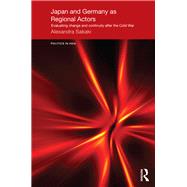- ISBN: 9780415697491 | 0415697492
- Cover: Hardcover
- Copyright: 8/25/2012
In the early to mid-1990s, numerous scholars examined and analyzed Germany's and Japan's foreign policies, often through comparative studies. The pressing question was whether the two countries '¬ ; given their new freedom and leeway after the Cold War '¬ ; would stake out new foreign policy courses with more unpredictability and potential for disruption or whether they would stick to traditional policy lines of self-restraint. Now, roughly two decades later, a fresh look at both countries' regional security behaviour promises new insights into the fundamental question: How have the foreign policies of these key powers evolved and what factors have driven the developments? A number of recent studies examine the degree to which the post-Cold War foreign policies of Germany and Japan have been marked by continuity versus change. However, most of them lack comparative perspectives. This book fills the gap in the academic literature by employing an explicitly comparative framework for analyzing and evaluating Germany's and Japan's post-Cold War regional foreign policy trajectories. The investigation is inspired by the observation that recent non-comparative assessments of the two countries '¬ ; in contrast to the studies of the early 1990s '¬ ; diverge considerably: Whereas the majority of accounts on Germany find overall continuity in the Federal Republic's foreign policy course after the Cold War, prominent works on Japan contend that the country has been undergoing a fundamental and extensive transformation. Would we still find a significant discrepancy, the study asks, if we adopted a comparative perspective, thereby 'calibrating' our evaluation of continuity versus change in one country through the parallel analysis of the other?







